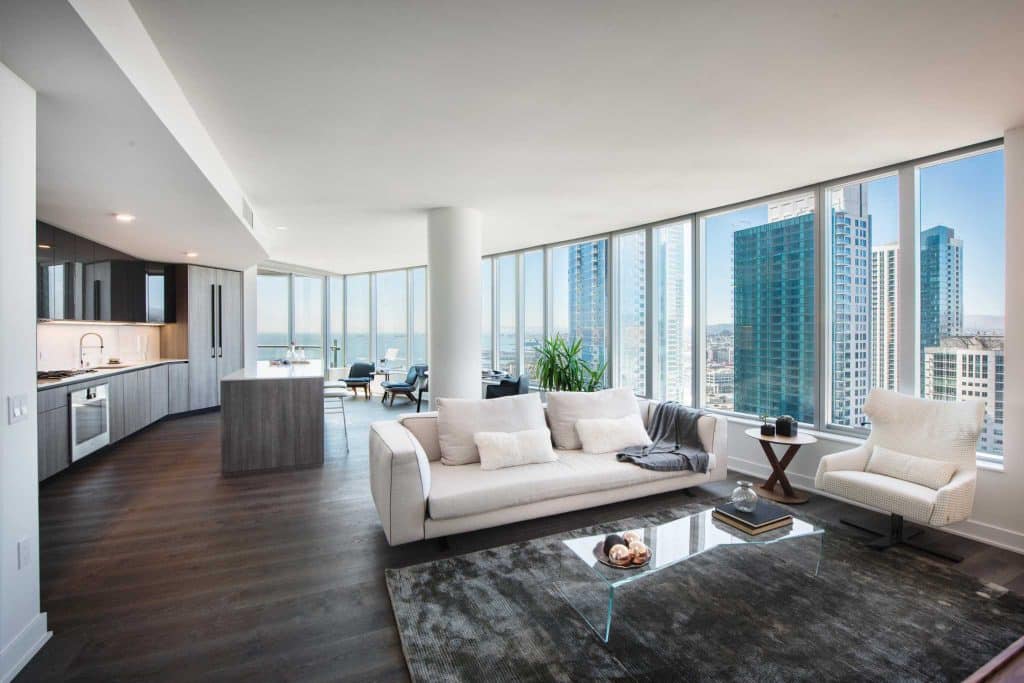San Francisco’s sluggish, post-COVID recovery is hammering the downtown condo market, with owners increasingly willing to sell at a discount amid ongoing tech layoffs and office closures, according to a new report of the real estate brokerage firm Compass.
According to the report, median condo sales prices in the Greater Downtown and South of Market neighborhood — which includes Civic Center, SoMa, Mission Bay, Yerba Buena and South Beach — were down 16.5% from one year ago. Since December of last year, the median selling price of condominiums has gone from $1.475 million to $1.23 million in these neighborhoods.
The decline in median prices in downtown neighborhoods was double that of other parts of the city. Outside of downtown, the median price for condos has fallen 7% over the past year, while single-family homes have fallen 7.5%.
While real estate brokers tend to be rosy in their marketing materials, the Compass report doesn’t sugarcoat the current situation. He concludes that the drop in demand is due to “a triple whammy of economic, demographic and quality of life problems”.
“I knew this market segment had weakened, but I didn’t realize how much things had changed,” said Patrick Carlisle, chief market analyst for Compass. “It was a little shocking.”
The problems are both macro and micro.
Nationally, you have a declining stock market, rising interest rates and rising inflation. Meanwhile, downtown San Francisco lags other cities in office occupancy, and the lack of foot traffic is crippling small businesses and making streets less safe. The apartment tower that grew south of Market Street over the past 20 years was meant to serve the hundreds of thousands of workers who poured into the city every morning. With these remote jobs, the demand for housing has diminished.
“San Francisco has gone from the hottest office market in the world to just about the weakest,” Carlisle said.
According to analysis by Socketsite, an online publication that tracks San Francisco real estate, two recent sales reports for Lumina, a two-tower luxury resort south of the market, show how the market has changed.
The first involves a 1,791-square-foot, three-bedroom, three-bathroom unit on the 32nd floor of the tower at 338 Main Street. This unit sold for $3.25 million in May 2016, then traded again in August 2019 for $3.5 million. In September this year, it hit the block again with a listing price of $3.15 million, before finally selling in November for $2.68 million, a 23.4% drop since 2019.
Meanwhile, a two-bedroom unit in the same tower is being marketed at $2.6 million, which, if it sold at that price, would represent a 21% drop from its 2016 price of $3,295. millions of dollars.
While the current market presents an opportunity for buyers, the rise in interest rates to a 20-year high is offsetting any savings that could be realized from lower prices, Carlisle said. But for buyers with cash for a down payment, or those willing to bet they can refinance at a lower interest rate, there are opportunities.
“Now is a great time for buyers to trade extremely aggressively,” he said. “If you see a unit you like, just ignore the asking price and decide what you’re willing to pay for it. There are a lot of sellers out there who just want to move on. If they’re able to close a agreement, they will, even if it is well below expectations.
Estate agent Kevin Birmingham of Park North Real Estate said the report matched what he was seeing in the city. He just sold a condo in the Twin Peaks area that was marketed at $695,000. It closed at $680,000. The seller expected to make $800,000.
Thus, many potential sellers are looking to rent out their units. “Listings are pulled and go straight to the rental market,” Birmingham said.
Gregg Lynn of Sotheby’s International Realty, which focuses on the luxury condo market, said the optimism of 2021 – when San Franciscans were getting their shots and starting to feel comfortable in crowds again – had given rise to uncertainty.
Some families who shopped before the pandemic hoping to split their time between San Francisco and wine country or Tahoe found they didn’t have much reason to come to the city. Others have purchased downtown condos to be near their children and grandchildren, only to have their offspring leave town.
“A lot of our customers don’t use their condos as much as they thought they would,” he said.
JK Dineen is a writer for the San Francisco Chronicle. Email: [email protected] Twitter: @sfjkdineen
